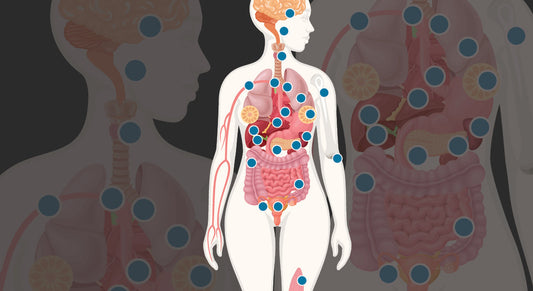Let's Talk About Vitamins And Supplements

Share
What Vitamin Should I Take?
One of the most common questions I’m asked is, “What vitamin should I be taking?” And the truth is, as we move through perimenopause and menopause, our nutritional requirements shift. It becomes more important than ever to focus on the key nutrients that support bone health, brain function, gut health, and overall inflammation.
While food should always be our first source of vitamins and minerals, many of us fall short in one or more areas—and that’s where smart supplementation can make a real difference. Here are some nutrients we may need to supplement:
Fiber
At least 25-35 g of Fiber daily: This can technically be attained via whole foods, but it usually is not. Tracking your nutrition in an app such as Cronometer can help you to determine if you hit this goal. If you fall short, I strongly recommend supplementation. The best fiber supplement options are those that combine insoluble and soluble fiber. I was not satisfied with any on the market, so I developed my own 'Pause Nutrition Fiber GDX Supplement.
Omega-3
Omega-3 is a little tricky… There is no “gram goal” to aim for per se, but your ratio of omega 6:omega 3 fatty acids is important, in order to have an optimum inflammatory response. The source of a majority of our fats needs to support a normal inflammatory response (omega 3s), rather than promote inflammation (omega 6s). It is possible to get a sufficient amount of omega 3 via whole foods, but it can be hard to do. For that reason, I recommend and always personally take an omega 3 supplement every day – there is no “harm” to be done, and it promotes a lower omega 6:3 ratio.*
Vitamin D
Roughly 600 IU Vitamin D: Vitamin D becomes increasingly essential with age, yet we tend to get less and less of it as we enter menopause. This vitamin is a “helper” for absorbing calcium, which is required for optimal bone health. Additionally, sufficient vitamin D has been shown to elevate your mood and increase cognitive performance, including visual memory. Vitamin D is more easily absorbed when taken in conjunction with a healthy fat and vitamin K, making our 'Pause Nutrition Omega 3 + Vitamin D & K a powerful combination.*
Turmeric
Roughly ~2 tsp of Turmeric per day: Turmeric is a spice that is primarily comprised of curcumin. Curcumin has long been studied to have many supportive benefits to our health. Namely, it is an antioxidant agent aiding in fighting oxidative stress. In menopause stages, support for body composition, gut health, and overall inflammation will support you. Using turmeric in recipes for curries, pastes, smoothies and soups can elevate your meals (~2 tsp) while providing a unique flavor. In addition, you may consider adding a turmeric supplement to your routine to ensure you are doing all you can to support a normal inflammatory response. Here is another source with suggestions on how to incorporate more turmeric into your diet.*
Magnesium
Magnesium is one mineral that can provide support and have a significant impact on sleep, blood glucose, active uptake of vitamin D, maintain healthy bone development. It is recommended that women receive 420 mg of elemental magnesium per day and there are plenty of delicious food sources you can add to your meals and snacks!*
In addition, to enjoying lots of magnesium rich foods, I personally supplement the amount of magnesium I get through my nutrition with Life Extension Neuro Mag. It is formulated with magnesium L-threonate which was developed at MIT and formulated to cross the blood-brain barrier.
You know I always look to the science and in a 12-week study of people ages 50 to 70, researchers found that this easily absorbed form of magnesium improves brain function such as nerve signal transmission.* Count me in on those benefits!
For more information see this YouTube video I recorded about why magnesium is so key to your health moving forward. I always recommend that you check with your clinician before beginning any supplementation, but if magnesium L-threonate is right for you, visit my Amazon storefront, or use this link to save 10% on Life Extension Neuro Mag and supplement the magnesium you get through your nutrition to enjoy all the benefits!
Calcium
Roughly 1200 mg/day of Calcium per day – however, this should be obtained via whole foods. Again, tracking your nutrition in Cronometer is helpful in determining how much you regularly obtain through your food consumption. Calcium promotes bone health, and if you're consistently low, work to incorporate more high calcium foods into your daily routine.* Should you truly require a supplement, I recommend Seen Nutrition Calcium Chews that are formulated with real, whole food ingredients. Use coupon MARYCLAIRE to save 10% on your order.
Collagen
Bonus Time! Collagen is a protein molecule known for being tough, reliable, and resilient. It’s so good at its job of connecting, creating, and supporting that you will find it all over your body. Collagen provides structure and substance to cartilage, tendons, muscle tissue, connective tissue, skin and bones.*
Researchers conclude that collagen supplementation of 5-15g per day aids in improving joint mobility, agility, body composition and muscle recovery. Collagen supplementation has been shown to decrease the appearance of wrinkles, improve the health of your skin and hair, and reduce cellulite.
Collagen supplementation can also support overall bone health. I chose to create 'Pause Nutrition Skin & Bone with a collagen peptide called FORTIBONE®, which was designed to stimulate bone cells to increase the synthesis of bone components. In an effort to simplify my collagen supplementation, I opted to include VERISOL®, a collagen peptide formulated to specifically support hair, skin and nails. With Skin & Bone, you truly can have it all!*
Bottom Line
There are several nutrients that become increasingly important as we age. If you’re not consistently hitting your needs through whole foods, supplementation can be a safe and effective way to bridge the gap.
My goal is always to help you approach your health from an evidence-based perspective, so you can feel your best through every stage of midlife and beyond. If you’d like to go deeper into how nutrition can support you during this transition, I cover this extensively in The Galveston Diet book and our digital Enhanced Program and through our ‘Pause Nutrition line of supplements.
And of course, always check with your healthcare provider before beginning any new regimen.
References
- Naeem, Zahid. “Vitamin d deficiency- an ignored epidemic.” International journal of health sciences vol. 4,1 (2010): V-VI.
- Hewlings, S. J., & Kalman, D. S. (2017). Curcumin: A Review of Its Effects on Human Health. Foods (Basel, Switzerland), 6(10), 92. https://doi.org/10.3390/foods6100092
- How does the skeletal muscle communicate with the brain in health and disease? Alinny R. Isaac, Ricardo A.S. Lima-Filho, Mychael V. Lourenco, vol. 197. https://doi.org/10.1016/j.neuropharm.2021.108744
- Calcium and vitamin D in post menopausal women Sameer Aggarwal, Nityanand https://pmc.ncbi.nlm.nih.gov/articles/PMC4046613/
- Proksch, E, Zague, V, Segger, D , Degwert, J and Oesser, S. “Oral intake of specific bioactive collagen peptides reduces skin wrinkles and increases dermal matrix synthesis.” 2014;27(3):113-9. doi: 10.1159/000355523. Epub 2013 Dec 24. PMID: 24401291 DOI: 10.1159/000355523
- Schunch, Michael, Zague, Vivian, Oesser, Steffen, and Proksch Ehrhardt. “Dietary Supplementation with Specific Collagen Peptides Has a Body Mass Index-Dependent Beneficial Effect on Cellulite Morphology.” 2015 Dec;18(12):1340-8. doi: 10.1089/jmf.2015.0022. Epub 2015 Nov 12. PMID: 26561784 PMCID: PMC4685482 DOI: 10.1089/jmf.2015.0022
- Proksch, E, Zague, V, Segger, D , Degwert, J and Oesser, S. “Oral intake of specific bioactive collagen peptides reduces skin wrinkles and increases dermal matrix synthesis.” 2014;27(3):113-9. doi: 10.1159/000355523. Epub 2013 Dec 24. PMID: 24401291 DOI: 10.1159/000355523
This article contains affiliate links.

















